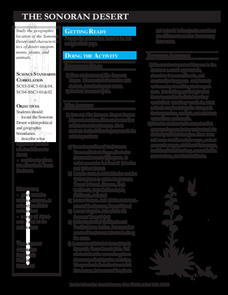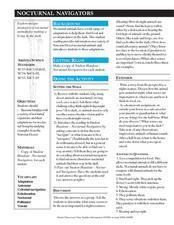Curated OER
The Sonoran Desert
Little learners examine a map of the southwestern United States and identify the Sonoran Desert. They locate different cities and rivers, determining whether or not each is found within this special ecosystem. A student handout is...
Curated OER
Animals of the Desert: Research
In this desert animals research instructional activity, learners prepare to write a report on a desert animal. Students read the list of animals, choose one and do the research to answer 8 questions about this animal.
Desert Discoveries
Nocturnal Navigators
Young biologists take a look at some of the unique ways that nocturnal animals survive in the dark. After reading a terrific student handout which is embedded in the plan, learners work together to answer questions about what they have...
Curated OER
Nocturnal Animals Cloze Activity
In this science cloze activity, 3rd graders fill in the 9 blanks in a selection about nocturnal animals. They use the words from a word bank at the bottom of the page to complete the paragraph. They cut out pictures of nocturnal animals...
Curated OER
Nocturnal Animals
In this animal worksheet, students complete a cloze activity about nocturnal animals by filling in the blanks in 2 paragraphs using 9 words from a word bank. They color and cut out 13 small pictures of nocturnal animals and paste them in...
Curated OER
The Desert Biome
Students create a visual presentation of the characteristics of a biome. Working in small groups, students use traditional and online resources to gather data concerning biomes. Students use their information to create a bulletin board...
Curated OER
Learning About Mammals
Young scholars study the mammal classification and forms of them living in the United States. In this mammal study lesson, students read through orders of mammals that exist in the United States. Young scholars also study the taxonomy of...
Curated OER
The Great Horned Owl
In this recognizing facts about the Great Horned Owl learning exercise, learners read fun facts, match illustrations with adaptations, sequence life cycle cards, and read what to do if they find an injured bird. Students solve 16 answers.









